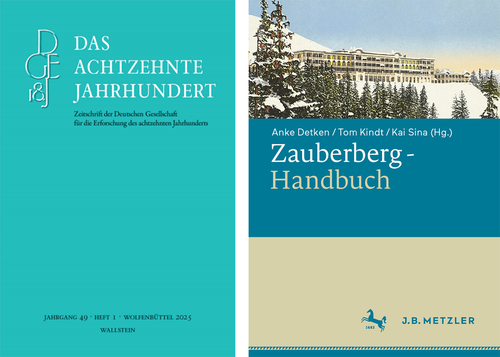Publications | Dîlan Canan Çakir on the Transtemporal Dialogicity of Eighteenth-Century One-Act Plays and on the International Reception of Mann's "The Magic Mountain"
News from Jun 05, 2025
Several sequels exist to Christian Leberecht Heyne's popular one-acter Die beiden Billets (1783), which was itself an adaptation of a French play by Jean-Pierre Claris de Florian that had premiered four years earlier. Between 1783 and 1815, authors such as Goethe, Schiller, Vulpius and Brentano produced sequels that testify to the original play’s cultural resonance. The latest article by Dîlan Canan Çakir (Research Area 5: Building Digital Communities) analyses the authors' motivations, recurring thematic elements and contemporary patterns of reception. Drawing on theories of entertainment theatre and one-act dramaturgy, the article contextualises the plays in question within a broader practice of literary dialogue and performative response in late eighteenth-century German theatre: By tracing how authors engaged dialogically across time and texts, Çakir sheds light on the formation of literary communities through practices of adaptation, emulation and seriality. The study is based on data derived from The Database of German-Language One-Act Plays (1740–1850), edited by Çakir and Frank Fischer and developed within Research Area 5.
Dîlan Canan Çakir. "'Der Wunsch euch zu gefallen'. Wie Goethe, Schiller, Vulpius, Brentano und andere dem populären Einakter Die beiden Billets in Fortsetzungen 'nacheiferten'." Das achtzehnte Jahrhundert 49.1 (2025): 77–98.
In his 1939 "Introduction to The Magic Mountain for Students at Princeton University", Thomas Mann observed with evident satisfaction that, of all his works, The Magic Mountain had aroused the greatest interest worldwide – particularly in America. This remarkable international echo serves as the starting point for Çakir's inquiry into the global critical engagement with Mann's text in her contribution to the fresh-off-the-press Zauberberg-Handbuch, a comprehensive handbook dedicated to the famous novel. Focusing on examples carefully selected from a century's worth of literary criticism, Çakir provides fresh insights into the global dynamics of literary transmission, translation and reception. As the chapter explores how a transnational and transhistorical community of readers has coalesced around The Magic Mountain, it showcases literature's capacity to generate shared temporalities across cultural and linguistic boundaries.
Dîlan Canan Çakir. "Internationale Literaturkritik". In Zauberberg-Handbuch, eds. Anke Detken, Tom Kindt and Kai Sina, 307–14. Stuttgart: J.B. Metzler, 2025.
